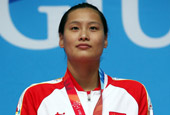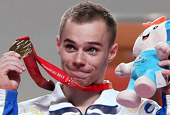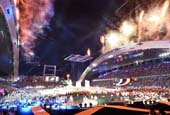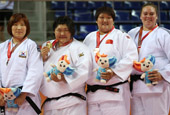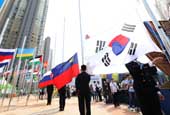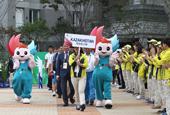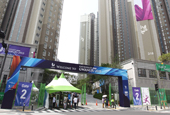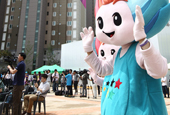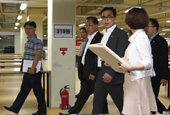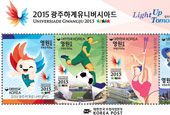The hospital at the Gwangju Summer Universiade athletes' village is busy with visitors from around the world.
The Gwangju Universiade hospital is getting crowded as the event hits its halfway point. There is an increasing number of athletes who have shown medical symptoms before or after their events.
Athletes are vulnerable to a range of diseases or injuries, as they often engage in fierce competition, and in a foreign country, too. However, the hospital acts as a reliable health guard for the athletes. The hospital carefully checks their condition and takes any necessary steps, if needed. If further examinations or additional measures are necessary, athletes are transferred to an outside hospital immediately.
The Gwangju Universiade hospital will only be open during the event, but it is close to a general hospital that offers a wide range of services. Seven medical institutions, including the Chonnam National University Hospital and the Chosun University Hospital, operate nine departments: emergency medicine, internal medicine, surgery, orthopedics, sports medicine, family medicine, dental care, ophthalmology and Oriental medicine. A total of 160 people, including 30 doctors, 86 nurses and 22 interpreters, provide medical care to athletes.
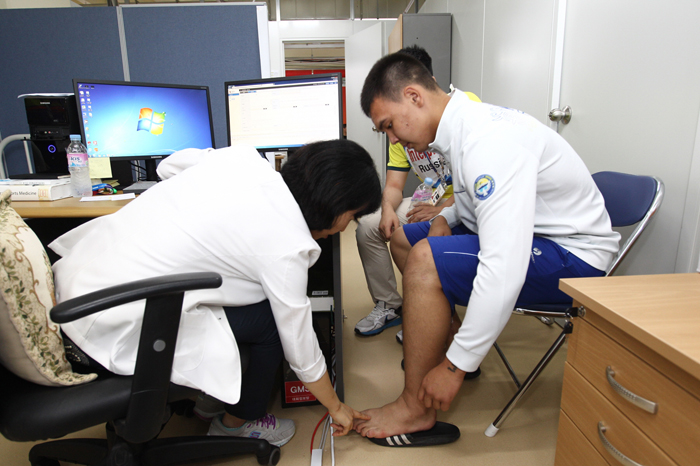
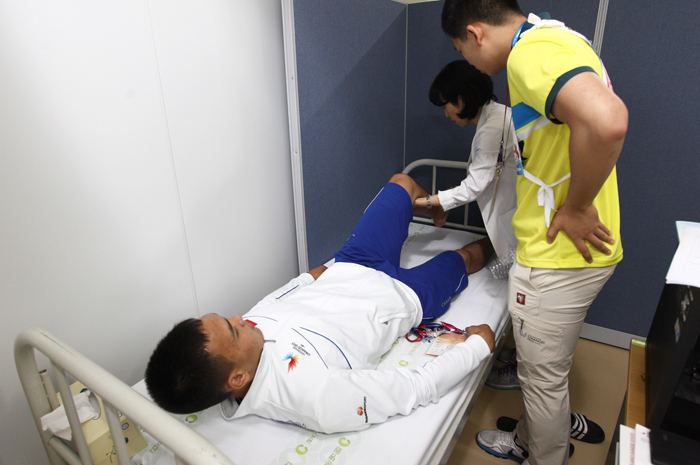
A total of 2,896 treatments have been undertaken at the hospital by the end of July 6, including 1,042 cases for the athletes. Of them, the number of sports-related cases was the highest, at 254.
Sports medicine is popular because athletes often want to have their muscles relaxed to stay in their best condition before a competition or they want to recover fast after a race. If their muscles are tight, they can visit the emergency medicine department and afterward receive treatment at the physical therapy clinic.
The next most popular department was Oriental medicine, with 184 cases. There were many athletes who wanted to undergo acupuncture or cupping therapy. Not only athletes from Asia, but also those from Western countries, have shown an interest in such treatments.
A large part of the medical expenses for foreign athletes and delegations is covered by insurance and the rest will be taken care of by the Gwangju Summer Universiade organizing committee.
"The professionalism at the facility and the ability of the medical professionals seems to be the best," said a tennis coach from Mali who visited the hospital for a headache. "It is so convenient because it is located in the athletes' village."
"My shoulder hurts and I am going to undergo physical therapy after talking to a doctor," said Tamaki Keiya, a Japanese handball player.
By Limb Jae-un
Korea.net Staff Writer
Photos courtesy of the Gwangju Summer Universiade Organizing Committee
jun2@korea.kr
The Gwangju Universiade hospital is getting crowded as the event hits its halfway point. There is an increasing number of athletes who have shown medical symptoms before or after their events.
Athletes are vulnerable to a range of diseases or injuries, as they often engage in fierce competition, and in a foreign country, too. However, the hospital acts as a reliable health guard for the athletes. The hospital carefully checks their condition and takes any necessary steps, if needed. If further examinations or additional measures are necessary, athletes are transferred to an outside hospital immediately.
The Gwangju Universiade hospital will only be open during the event, but it is close to a general hospital that offers a wide range of services. Seven medical institutions, including the Chonnam National University Hospital and the Chosun University Hospital, operate nine departments: emergency medicine, internal medicine, surgery, orthopedics, sports medicine, family medicine, dental care, ophthalmology and Oriental medicine. A total of 160 people, including 30 doctors, 86 nurses and 22 interpreters, provide medical care to athletes.


An athlete at the Gwangju Summer Universiade is being examined at the hospital.
A total of 2,896 treatments have been undertaken at the hospital by the end of July 6, including 1,042 cases for the athletes. Of them, the number of sports-related cases was the highest, at 254.
Sports medicine is popular because athletes often want to have their muscles relaxed to stay in their best condition before a competition or they want to recover fast after a race. If their muscles are tight, they can visit the emergency medicine department and afterward receive treatment at the physical therapy clinic.
The next most popular department was Oriental medicine, with 184 cases. There were many athletes who wanted to undergo acupuncture or cupping therapy. Not only athletes from Asia, but also those from Western countries, have shown an interest in such treatments.
A large part of the medical expenses for foreign athletes and delegations is covered by insurance and the rest will be taken care of by the Gwangju Summer Universiade organizing committee.
"The professionalism at the facility and the ability of the medical professionals seems to be the best," said a tennis coach from Mali who visited the hospital for a headache. "It is so convenient because it is located in the athletes' village."
"My shoulder hurts and I am going to undergo physical therapy after talking to a doctor," said Tamaki Keiya, a Japanese handball player.
By Limb Jae-un
Korea.net Staff Writer
Photos courtesy of the Gwangju Summer Universiade Organizing Committee
jun2@korea.kr
